Julia Buckley's Blog, page 10
July 14, 2012
More great summer reading!
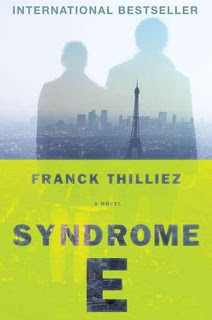
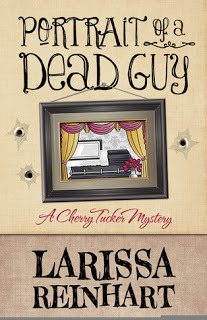
I am currently immersed in Franck Thilliez' thriller, SYNDROME E, which has apparently already been purchased by a Hollywood studio for eventual movie magic. The tale combines the talents of a female cop who must juggle a sick child in the hospital, another child at camp, a very hot summer, and a busman's holiday of a vacation in which she ends up investigating a very disturbing film that leads to a friend's hysterical blindness.
On a different case (which will soon be related, I think), Franck Sharko, an officer of the Paris police, must investigate the appearance of five badly-mangled bodies recently unearthed at a construction site.
The book is fascinating, not only for its details about film, embedded images, and the unconscious, but also because of its discussion of neuroscience. A wonderful way to pass a hot summer day!!
Next up is Larissa Reinhart's PORTRAIT OF A DEAD GUY, which looks as though it will be much lighter, less stressful fare than Thilliez' SYNDROME. But Reinhart's book has a very unusual premise: that an artist is asked to paint a portrait of a dead man for that man's grieving family, and in the process she becomes involved in some unsavory situations. Looks promising!

Published on July 14, 2012 13:42
June 30, 2012
Everything but the Squeal
 Check out John Barlow's post on Poe's Deadly Daughters this weekend, and be sure to get his free book today!
Check out John Barlow's post on Poe's Deadly Daughters this weekend, and be sure to get his free book today!
Published on June 30, 2012 08:05
June 13, 2012
Longmire Returns!
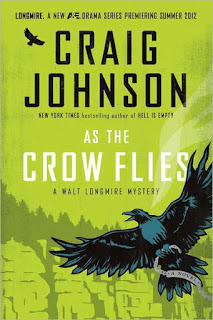 I'm thrilled to be starting Craig Johnson's AS THE CROW FLIES, especially with the arrival of A&E's LONGMIRE, based on Johnson's mystery novels.
I'm thrilled to be starting Craig Johnson's AS THE CROW FLIES, especially with the arrival of A&E's LONGMIRE, based on Johnson's mystery novels.I've interviewed Johnson here twice (see the list in the right-hand column to read the interviews), and I've also noted the similarities between Johnson and the great Ross MacDonald. So I'm no stranger to Johnson's series, or to the excellence of his writing.
In this eighth mystery, Walt Longmire must negotiate the perilous waters of his daughter's pre-wedding tensions as well as investigate an unexpected death which is not in his territory.
As always, I'm looking forward to immersing myself in one of Johnson's tales, right after I finish Lori Roy's BENT ROAD, which is currently keeping me in suspense!

Published on June 13, 2012 11:17
June 6, 2012
What I'm Reading . . .
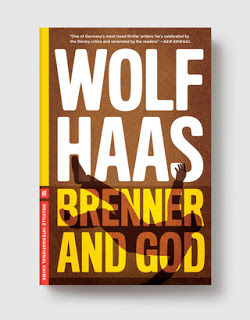 I'm not quite finished with this gem of a German crime novel, but I'm already a Wolf Haas fan. What a fun, fresh, clever book! More on this soon.
I'm not quite finished with this gem of a German crime novel, but I'm already a Wolf Haas fan. What a fun, fresh, clever book! More on this soon.Brenner and God will come out soon from Melville Press.

Published on June 06, 2012 15:31
May 20, 2012
Mystery Writer Joyce Yarrow on New York Streets, Russian Gulags, and Indian Poetry
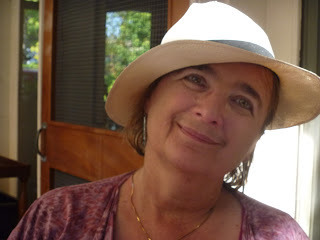
Joyce, I enjoyed reading CODE OF THIEVES; it was exciting and educational!
Jo Epstein is a cool creation—independent, poetic, street smart, brave. How did you go about choosing all the pieces of her character?
Thank you Julia, I’m so glad you connected with Jo. My brother Rick and I grew up together in a tough neighborhood in the SE Bronx. Rick used his street smarts to become an ace detective, whereas I chose to write poetry and eventually, novels.
So in poet/detective Jo Epstein, I created a hybrid, based on both of us. I also gave Jo some characteristics drawn from a friend who hosts the Seattle Poetry Slam and is capable of quoting Shakespeare or Milton one moment and bad-mouthing hecklers the next. In CODE OF THIEVES, Jo provides security services for Scandals, the fictitious bar hosting the NY Poetry Slam team.
Jo notes that “Privacy . . . was a word that in our post-911 world was rapidly losing its meaning, like democracy.” Jo understands, as an investigator, that anyone’s privacy is a tenuous thing. But is her comment about Democracy fueled by her disenchantment with government (or yours)?
I wrote CODE OF THIEVES around the same time that the story broke about the NSA warrantless wiretapping. So Jo’s views on the value of civil liberties do reflect my own. She is not ‘anti-government’ per se – having seen the danger of anarchy first-hand while growing up in NY. Like most P.I.’s she values her contacts in the police department, while at the same time protecting her sources, and her freedom to act independently.
Did you travel to Russia to research this book?
Yes – and my trip to Moscow and The Golden Ring proved invaluable. In addition to Vladimir Central Prison (we were the first Americans to tour this infamous prison) almost every place my son and I visited made its way into CODE OF THIEVES—the home where we stayed in Moscow, the Monastery of St. Euthimius and the Matryoshka factory in Suzdal, the headquarters of the Moscow Criminal Police at 38 Petrovka Street, even the disco at the Vladimir Hotel.
A highlight of the research trip was dinner with a Commander in the Russian Criminal Police, who blessed my plot. Commander Eshau was very generous. He helped me to add dimension to the antagonist in CODE OF THIEVES –who has a strong association with the Russian criminal subculture known the vory v zakone, (thieves-in-law). The vory adhere to an intricate set of rules of conduct –the ‘code’- as referenced in the book’s title. In the old days, they prided themselves on sharing their loot and contributed to a communal fund that helped the families of members who were imprisoned. Today their ranks have thinned and they have been pushed out by the modern Russian mafia.
Matryoshki, the Russian nesting dolls, figure very prominently in your plot. Do you own any? How did you go about researching them for this book?
A writer is fortunate indeed to discover a ‘telling detail’ that transforms into a symbol powerful enough to generate a storyline. When I asked myself, ‘how would the blackmailer of a Russian émigré communicate with his victim?,’ the answer came back loud and clear—he would send messages inside a series of Matryoshka dolls that fit together in the same way the plot of a mystery unfolds. From that point on, I knew CODE OF THIEVES would have a solid structure J.
Great! One of your characters says “Everyone in Russia has at least one ancestor or family member who has been in prison.” This is a shocking fact! How did you come to find out this stark reality?As documented by many historians and of course by Nobel prize-winning Aleksandr Solzhenitsyn, 14 million people were imprisoned in Stalin’s GULAG ‘labor camps’ from 1929 to 1953 and another 6-7 million were sent to camps in remote areas of the USSR. It made sense to me that most Russians would have a family tree affected by this tragedy.
Jo identifies Putin as “still undoubtedly the most powerful man in Russia,” but that was written before Putin’s recent rise to the presidency. Is Putin good for Russia, or bad?
The book was written while Medvedev was President and it was obvious at that time that he was a figurehead and Putin would return to power, just as he has. Russians have always preferred strong leaders, and there is no doubt Putin qualifies in this respect. On the other hand, his persecution of opposition leaders and journalists is well-known and greatly resented by the populace—and personally, I do not think he is good for the development of democracy in Russia.
Are you of Russian heritage?
My own heritage is murky…but I do know that my last name, Yarrow, was shortened by a busy customs officer on Ellis Island from the original Yaroslavky. This name is common in Belarus, I am told, but it could also be of Polish origin.
At one point we are told that “Amnesia is a common folk remedy in Russia,” and that Yeltsin was “a drunk . . . who gave away his country’s resources to Mafia thugs.” Are things better today in Russia, the same, or worse?
 Since I am no political scientist, I can only share anecdotal evidence. Some of the young people I met in Moscow were very optimistic about the new economic freedoms. They were also the sons and daughters of the exceedingly rich elite that emerged in the 90’s, due to the boom in oil and gas. The older, and I think wiser, people I met seemed to agree with the French proverb, ‘The more things change the more they stay the same.’ Although I found this view to be widespread, Russians are not the pessimistic, depressed people portrayed in literature and the press. On the whole I found them to be bright, enthusiastic and well read—willing to stay up all night and talk world politics at the drop of a hat. And they LOVE meeting writers!
Since I am no political scientist, I can only share anecdotal evidence. Some of the young people I met in Moscow were very optimistic about the new economic freedoms. They were also the sons and daughters of the exceedingly rich elite that emerged in the 90’s, due to the boom in oil and gas. The older, and I think wiser, people I met seemed to agree with the French proverb, ‘The more things change the more they stay the same.’ Although I found this view to be widespread, Russians are not the pessimistic, depressed people portrayed in literature and the press. On the whole I found them to be bright, enthusiastic and well read—willing to stay up all night and talk world politics at the drop of a hat. And they LOVE meeting writers!One Russian tells Jo that “Americans are seen as misinformed cretins gulping down press releases fed to the media by the military industrial complex.” Actually, I think it’s not only Russians who have this perception of America—but do you think it is the primary view of Americans by Russians?
The character in the book who utters these cynical words is busy justifying his own nefarious activities by painting others with the same brush. That said, many of the people I met were angry about the war in Iraq. They were also sympathetic with the American people, who they see as betrayed by their leaders – a familiar scenario in Russia.
It’s impossible to generalize about Russia – it is so immense! What I tried to do was to present a well-rounded view based on my own experiences and research. One of my most treasured reviews was written by a Russian-American, Lyuda West, who said “The author touches different aspects of Russian life, from criminals’ rules and corrupted officials to "New Russian" businessmen and ordinary people, adding to it the mystery of a murder and secrets of the past.”
Are you working on a new Jo Epstein mystery?
Yes. The story has a scientific bent this time…
Have you read CRIME AND PUNISHMENT, perhaps the most famous of Russian crime novels?
Yes – Dostoyevsky is a favorite writer and this book in particular. He was so far ahead of his time – in introducing the ‘anti-hero,’ now a fixture in literature, in introducing deep psychological profiling as part of the story, in having the courage to explore the darkest depths of the psyche with compassion and clarity.
Who are some of your literary influences?
Oh my. As a young poet I’d have to say Rimbaud – and as a budding story writer, the existentialists—Sartre and Camus. Then later, Simenon and Chandler for mysteries and Flaubert and Franzen for literary fiction (alliteration a coincidence). Lately I have been reading Indian authors, since I am collaborating on a book with a writer from Allahabad. I am delving into Rabindranath Tagore’s works—poetry, short stories and plays. I love Kiran Desai.
Wow--a lot of your favorites are my favorites, too! I teach THE STRANGER and it's become an influential book for me. I also once taught Chandler's THE LONG GOODBYE in a mystery course--such great books!
Thanks for chatting, Joyce!
The feeling is mutual, Julia. Your questions revealed much about your own passion for looking under the surface and getting to an author’s intentions. I appreciate this opportunity to share some of the underpinnings of CODE OF THIEVES and to re-visit some of the choices I made both as a writer and a traveler.. J

Published on May 20, 2012 18:31
May 19, 2012
Now Reading
 Code of Thieves, by Joyce Yarrow. What a fun yet tense book, in which sleuth Jo Epstein, a poet and a private investigator, takes her investigation all the way from New York City to Moscow in order to prove a man's innocence.
Code of Thieves, by Joyce Yarrow. What a fun yet tense book, in which sleuth Jo Epstein, a poet and a private investigator, takes her investigation all the way from New York City to Moscow in order to prove a man's innocence.The secrets she exposes along the way put her at odds with the police and in danger of losing her life.
I'm impressed with Yarrow's spare writing style and fast-moving plot.
More later, which will hopefully include an interview with Yarrow about all things Russian.

Published on May 19, 2012 11:59
April 25, 2012
Swedish Writer Ake Edwardson on Mystery, Melancholy, and Macbeth
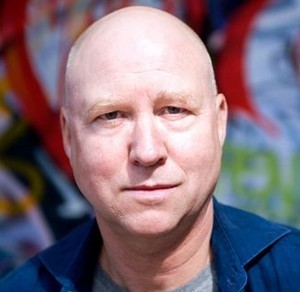 Ake Edwardson is one of Scandinavia's most successful crime writers; a former journalist, he has won many accolades for his mysteries and three awards from the Swedish Crime Writers' Association.
Ake Edwardson is one of Scandinavia's most successful crime writers; a former journalist, he has won many accolades for his mysteries and three awards from the Swedish Crime Writers' Association. His latest novel is Sail of Stone.
Ake, Thank you for chatting. SAIL OF STONE is a beautiful book which seems far more about questions than about answers. Is your detective, Erik Winter, as much a philosopher as he is a solver of mysteries?
He's at least as much a philosopher as a detective. Winter is a moral animal, not a political one. He's trying to live a decent life, and it's the hardest thing. These stories are about the existence, the meaning of life, or, as Winter says, "This job is more about the meaning of death than the mening of life." I think anyone who pushes him/herself to the limit is a philosopher; the heavyweight champions were philosophers first, boxers second.
Both storylines involve mysteries with elusive subjects. Even the people who are found and questioned by the police seem to offer very little in terms of satisfying answers. Do you think that police work is always this frustrating?
It's very frustrating; it's not for sissies. One of my best friends is head of the crime squad in Gothenburg. He wouldn't do anything but this, but, as he says, "it's like a war you really can't win, but you have to fight it anyway." Yeah, what's the alternative?
The book is starkly beautiful in its existential focus, from Aneta Djanali, who “dreamed of doors that closed and never opened,” and Erik Winter, who is aware that he “carrie[s] a restlessness in him.” Are they drawn to their profession because they are restless, or are they restless as a result of their profession?
Very good question. I think it works both ways - you have to have a certain personality to become a detective, and the pressure and desperation of the job is like a drug. It's not healthy. The only other profession I can compare it with is writing.
Aha! What an interesting comparison!
There are many allusions to Macbeth throughout the novel, especially appropriate since Winter and his friend McDonald visit Forres and the site of Cawdor Castle. Is Macbetha favorite work of yours, or did you just think it had an appropriate thematic parallel?
I've always been a big admirer of the play. It has absolutely everything. In the early '70s I saw Roman Polanski's film adaption of Macbeth (that was shortly after the Manson murders) and that movie took the breath out of you-- it was as if the crew was on location in that horrible piece of the past. So I used this theme in the book; it worked well, I think.
The sea becomes a grave symbol of relentless nature. My favorite line is “There’s really no day at sea, and no night.” It reminded me of a line from a story by Crane or Hemingway. Are you a fan of either of these authors?
Ernest Hemingway's short short stories changed writing forever, just as Nikolaj Gogol's stories changed everything 120 years earlier. I rest my case. The sea? It's the big mother of it all; if you stay away from the sea you dry up, shrink to the ground before your time.
Music plays an important role in the lives of both detectives, and it helps to set the mood. Winter seems especially to like jazz and old American tunes. Do you share any of his musical preferences?
I'm more a rock'n'roll man, play a bit guitar. Jazz is the grown up man's music; I will never mature that much myself. I've always been into Americana. A favourite now is Richmond Fontaine, out of Portland; the singer and songwriter Wily Vlautin is a friend of mine, and he's also a damned good novelist.
I love the way that you use color to set the mood. I found these lines particularly beautiful:
“She smelled like blue autumn evening and salty wind and black mud and gasoline fumes, which together made up this city’s perfume. It was a blue evening. Vasaplatsen was a blue address. Kind of blue.”
And later: “The usual blue light came in through the window. The streetcars hadn’t yet begun to rumble by . . . .” For me, this use of blue seems both mysterious and sad, yet somehow beautiful and satisfying. What did it mean for you as you wrote it?
I'm a sad person, or melancholic, and down right pessimistic most of the time. Probably that's why I laugh so much; you have to laugh at all the madness around you or you'll go stark raving mad, start running screaming through the streets naked in the night with just your underwear in your hand. Yes, blue is the color I would give up last--it sums up all feelings.
Winter has become overwhelmed with deaths and announcements of deaths to grieving families. He concludes that “Life didn’t belong to eternity, it was death that was eternity; life was the pause between quiet eternities.” Yet later in the novel he is farther away from despair and ready to embrace “a new era.”
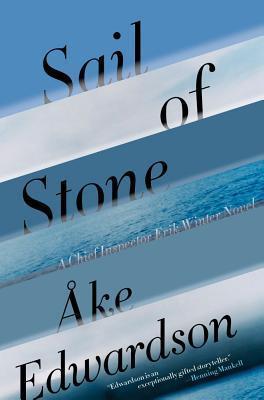 Is Winter generally a hopeful person, or a despairing one? Or will he ever fluctuate between the two?
Is Winter generally a hopeful person, or a despairing one? Or will he ever fluctuate between the two?If he didn't have hope, he would give up straight away. That's what distinct these books from James Ellroy's, for instance, his stuff is wonderfully dark but there is absolutely no hope, no lining anywhere in the clouds. I couldn't go that far, neither could Winter. See above also of fighting that war.
Who are some of your literary influences?
When I was a teenager I read the Russians, Dostojevskij, Turgenjev, Tjekov, Gogol... I also red the classic Americans, Dos Passos, Steinbeck, Faulkner. For some reason I'm the only one in Sweden who has read Walker Percy! The latest American book that impressed me the most was Andre Dubus III, Townie, from last year. There are also some wonderful Swedish writers; the best is Wilhelm Moberg, from the 40's and 50's.
If you didn’t live in Sweden, where would you want to live?
I've been traveling and working abroad a lot, I love almost everything everywhere abroad. A favourite is Penang in Malaysia, or Rome, or Provence, or Andalucia, or Hanoi... I'm the only Swede that I know of who loves Los Angeles!
You are a former journalist; what do you think of the state of journalism today? Is there still objectivity in the news?
It's a "war" you can't win, the good and serious stuff goes slowly/fast down the drain, the horror of banality takes over, knowledge gets confused with information. Still there's wonderful journalism out there; Sweden tries to mantain decent newspapers, and the best papers in USA, England, France and Germany are still worth reading/working for. The problem is of course that good journalism is expensive, objectivity is expensive, to send a reporter to the other side of the world is expensive, or have a team work on some investigation for a long time.
You also write children’s books. Which do you find easier to do: telling a story to children, or to adults?
Writing is very hard, if you are serious. I don't really tell a story differently for young adult readers compared to adults, and I have written 21 books in different genres. It's just the perspective that can change a little--the style is the same, the language. Recently I heard Martin Amis say that he could very well write for children, "If I had a stroke." That's a stupid remark from an otherwise bright guy.
Thanks so much for the interview!
All the best to my readers out there.

Published on April 25, 2012 20:32
April 15, 2012
A Great Review for GLW
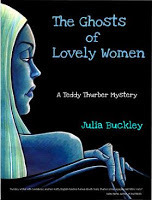 Mystery and Me published a positive review of THE GHOSTS OF LOVELY WOMEN; it calls my latest mystery "a book of merit . . . for its thought-provoking theme." You can read the review here.
Mystery and Me published a positive review of THE GHOSTS OF LOVELY WOMEN; it calls my latest mystery "a book of merit . . . for its thought-provoking theme." You can read the review here.I'm pleased to hear the reader response to this Teddy Thurber novel, and I hope to provide a new one in about six months.

Published on April 15, 2012 19:10
April 1, 2012
Game of Thrones Returns!
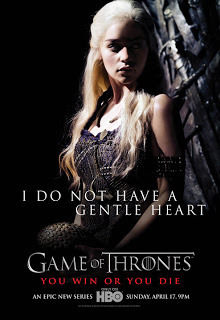 Fans of George R.R. Martin's books and of the HBO series based upon them can rejoice tonight, as HBO launches the first episodes of Season Two.
Fans of George R.R. Martin's books and of the HBO series based upon them can rejoice tonight, as HBO launches the first episodes of Season Two. Like any series with long books, this fantasy suffered the loss of many details in the re-telling for the screen, but the ultimate product is stylish, beautiful, and compelling. One of my favorite characters, Daenerys Targaryen, is played by the relatively unknown Emilia Clarke, who brings the perfect blend of beauty and fierceness to the role of the Dragon Queen.
I am excited about the new season; I'm still flying my sigil for House Stark, but I have my favorites in other houses. :)

Published on April 01, 2012 15:43
March 27, 2012
Good News For Spenser Fans
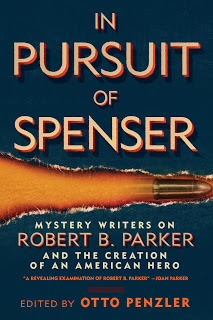 Thanks to Kristen at SmartPop Books, I will soon have my paws on a review copy of a Robert Parker tribute book called In Pursuit of Spenser. According to the Press Release:
Thanks to Kristen at SmartPop Books, I will soon have my paws on a review copy of a Robert Parker tribute book called In Pursuit of Spenser. According to the Press Release:"In 2010 the world lost iconic American writer Robert B. Parker, along with his greatest creation, Spenser. In celebration of both, Smart Pop is releasing In Pursuit of Spenser: Mystery Writers on Robert B. Parker and the Creation of an American Hero, an anthology of essays by those who knew Parker and Spenser best: his fellow mystery writers."
The book was edited by the great Otto Penzler, and contributors include Lawrence Block, Max Allan Collins, and Dennis Lehane.
My husband and I are Spenser fans from way back, so we'll both be excited to read these tributes to a great writer and reminisce about a great character.

Published on March 27, 2012 17:22



